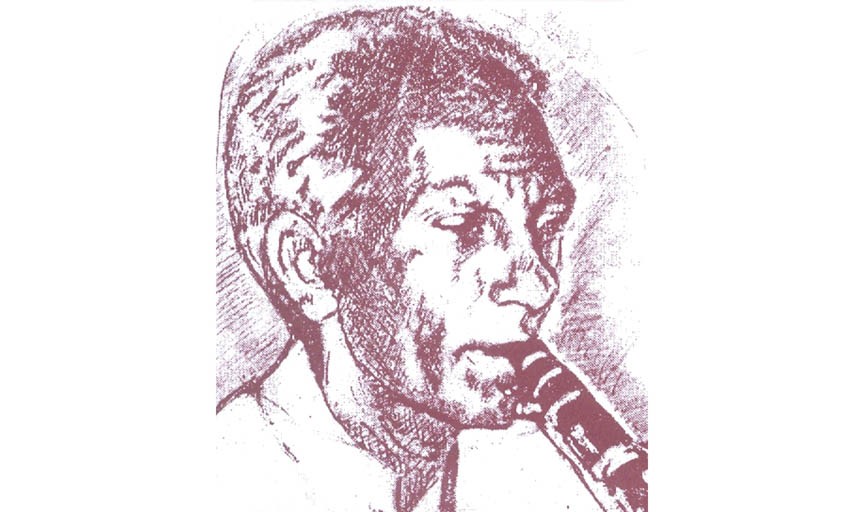
Musicians pay tribute to Ustad Sadiq Ali Mando at Alhamra Lahore

The sixteenth barsi of Ustad Sadiq Ali Mando, one of the leading players of clarinet was held at the Alhamra last week where homage in word and deed was paid in an ethos steeped in the traditions of music.
Ustad Sadiq Ali Mando was a very good clarinet player and he approached music within the framework of a definite method. He was educated in music by Mubarak Ali Khan and Fateh Ali Khan, the qawwal duo that took qawwali to a very high point and paved the way for Nusrat Fateh Ali Khan to break new ground with this genre in the decades to come. Mubarak Ali and Fateh Ali as qawwals were properly trained and they laid the foundation of the qawwali on raagdari, the exploration of the tonal patterns of the raags and the discovery of the rhythmic divisions. They drew their musical heritage from the family of Behram Khan, the legendary dhrupad vocalist from Jaipur.
Wajahat Attre, the music composer paid homage to the ustad. His father Rashid Attre was friends with Ustad Mando and when he took lessons from his father he made it a point to repeat that before Ustad Mando, who encouraged him and gave him advice on maintaining the rigour and discipline of the riyaz without losing the flair for it. In a way Mando secretly monitored his growth.
In an age when technology is fast changing instrumentation natural sound is becoming an echo from the past raising grave concerns whether the players of natural sound will last or give way to ever new instrumentation and computer generated sounds. In the barsi Jaffer Hussain Khan Performance on the clarinet restored some faith in sticking to tradition and not being swept away by the flood of change that is being witnessed these days. He played raag charukeshi with steadied composure and gave a good account of himself in all the three registers and the various tempos.
It must be said also that there are very few practitioners of the clarinet left and Jaffer Hussain Khan, in middle age is not really being pushed to be overtaken in virtuosity by someone comparatively younger.
During the course of the colonial encounter many purely western instruments were adapted to be played according to the particularities of our music. The primary concern was to make the note malleable--clarinet, a western instrument supposed to produce the staccato note, did not have the capacity to incorporate the microtones, which is the very essence of our music. But in the hands of many of our masters such instruments were played very differently and almost sounded like our very own. Many other western instruments too have been modified in the same manner and they now also appear to be our own--the list is long and impressive and can begin with the harmonium which has disappeared from the western orchestras but finds a permanent place in our music. Violin, piano and even the guitar are played with the desire to do away with the rigidity of the staccato note.
Clarinet’s staccato note was mixed with the delight of meend, the glides and the intoning of the microtones. The instrument could be played solo with the exploration of the raag and it came out of the shadow of merely being an instrument that formed part of an orchestra. In the Punjab, Ustads Shahjahan, Jahangir and Aurangzeb were also great clarinet players. They had formed a band and since the clarinet was an essential instrument of a band they started to play raags on them instead of western compositions. These bands were usually engaged on marriage ceremonies and Jahangir, Alamgir and Aurangzeb along with another band led by Master Sohni were the leading exponents of the instrument.
The performance of Mehmoodul Hasan Jaggo and his son Shahid Ali Jaggo on the tabla too was the salient feature of the barsi. The two played eiktal in the various qaidas, parans and relas and brought out the strong points of the baaj as it was developed by the shagirds of Ustad Fateh Din of Kasur. The others who performed were Rafeeq Hussain, Saleem Bazmi, AbuBakar Fayyaz and Muhammed Akhter. The musical session was rounded off by Aqeel Manzoor, a very good ghazal gaik but underrated. He has the relevant command over the sur and its various alankaras especially those employed to go along with the kalaam that is being sung. The musicians who accompanied during the evening were Jimmi Khan and Shahid Ali on the tabla, Muhammed Aslam on the harmonium, Faqir Hussain Khan on the sarangi and Ghulam Sabir on the tanpura.
This barsi in particular was more than a routine affair because the son of Ustad Sadiq Ali Mando Ghulam Haider, a scholar of music besides being a practicing musician is fully cognizant of the need to keep such institutions going. He established the Pakistan Classical Music Guild many decades ago as a platform both for the established ustads and the aspiring young musicians. All through, since its inception, it has been holding programmes, though it may be conceded without consistency. Usually the lack of funds and not the fazing of desire has been the main cause of these breaks but, despite the absence of resources, the presence of Ustad Ghulam Haider has ensured that programmes are held. The Pakistan Classical Music Guild continues to serve the purpose for which it was established decades ago.